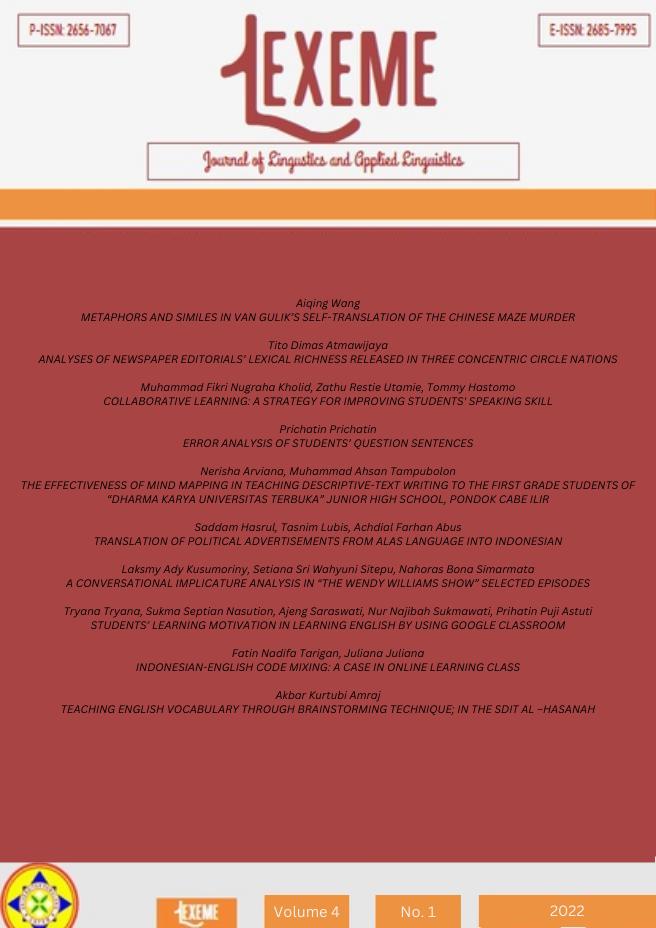STUDENTS’ LEARNING MOTIVATION IN LEARNING ENGLISH BY USING GOOGLE CLASSROOM
DOI:
https://doi.org/10.32493/ljlal.v4i1.19352Keywords:
Google classroom, learning motivationAbstract
This study aims at finding out the students' learning motivation in online learning using Google Classroom during the Covid-19 pandemic at SMP Muhammadiyah 29 Sawangan. This study applies the descriptive qualitative research method. There were 36 students in eighth-grade D students at SMP Muhammadiyah 29 Sawangan- Depok who participated in this research. The data were collected through a questionnaire, interviews, and observation. The result of the questionnaire is the students are motivated because some of them are very enthusiastic about learning English during a pandemic covid-19. In the interview, the teacher always gives motivation for students to learn English, and some of the students consider using google classroom helpful for the teaching-learning process in this era. In the observed teaching-learning process, the students actively learn English using Google Classroom, and the teacher always gives the materials for students learning English in the forum, and always explain materials. In this study, the students are motivated to always learn English by using Google Classroom because the students know their responsibilities as students always learn, and students also always motivate themselves to be enthusiastic about learning because for their future. For further study are expected to continue to develop research on student learning motivation because research on student learning motivation aims to find out what makes students motivated to study hard.
References
Creswel, J. W. (2011). Educational Research Planning, Conducting, and Evaluating Quantitative and Qualitative Research (fourth ed.). University of Nebraska–Lincoln: Pearson.
Jamieson, S. (2004). Likert scales: how to (ab)use them (Vol. 38). New York: Blackwell Publishing Ltd MEDICAL EDUCATION..
Moleong, L. J. (2017). Metodologi Penelitian Kualitatif. Bandung: Remaja.
Nasution, S. S., Tryana, T., Sagimin, E. M., & Gintings, M. F. M. (2021). The Challenges of Using E-Learning Platform amid Covid-19 Outbreak: Voices from the Lecturers.
Perez, P. (2015). securedgenetworks. Diambil kembali dari https://www.securedgenetworks.com/blog/how-google-classroom-is-making-interactive-learning-more-productive
Rossett, A. (2002). Waking in the night and thinking about e-learning.In A. Rossett (Ed.), The ASTD e-learning handbook (pp. 3–18). New York: McGraw-Hill.
Stoetzel, L. a. (2020). How Online Learning Can Address the Gap in Preparing K-12 Instructional Coaches. Teaching and Teacher Education 88:102959.
Sugiyono. (2012). Metode penelitian kuantitatif, kualitatif dan R&D. Bandung: ALFA BETA.
Sugiyono, P. D. (2015). METODE PENELITIAN PENDIDIKAN (Pendekatan Kuantitatif, Kualitatif, dan R&D). Bandung: Alfabeta .
Sugiyono, P. D. (2015). METODE PENELITIAN PENDIDIKAN (Pendekatan Kuantitatif, Kualitatif, dan R&D). Bandung: ALFABETA. cv.
Sukmawati, & Nensia. (2019). The role of Google Classroom in ELT. International Journal for Educational and Vocational Studies, 142. doi:DOI: https://doi.org/10.29103/ijevs.v1i2.1526
Taman, P., Nasution, S. S., Hastomo, T., Sukmawati, N. N., & Kusumoriny, L. A. (2021). THE YOUNG LEARNERS’PERCEPTION TOWARDS ENGLISH INSTRUCTIONAL PRACTICES USING VIRTUAL PLATFORMS. JOALL (Journal of Applied Linguistics and Literature), 6(2), 181-193.
Thohir, L. (2017). Motivation in a Foreign Language Teaching and Learning. Journal for Language and Foreign Language Learning. Diambil kembali dari https://journal.walisongo.ac.id/index.php/vision/article/view/1580.
Uno, H. B. (2008). Teori Motivasi & Pengukuran. jakarta: PT Bumi Aksara.
Yates, D. (2017). Google Classroom Easiest Teacher's Guide to Master Google Classroom. Retrieved from https://www.pdfdrive.com/google-classroom-easiest-teachers-guide-to-master-google-classroom-google-classroom-app-google-classroom-for-teachers-google-classroom-book-1-d158049011.html.%20accessed%2027%20April%202019
Zainal, Z. (2007). Case study as a research method. Jurnal kemanusiaan, (9), 1-6.







